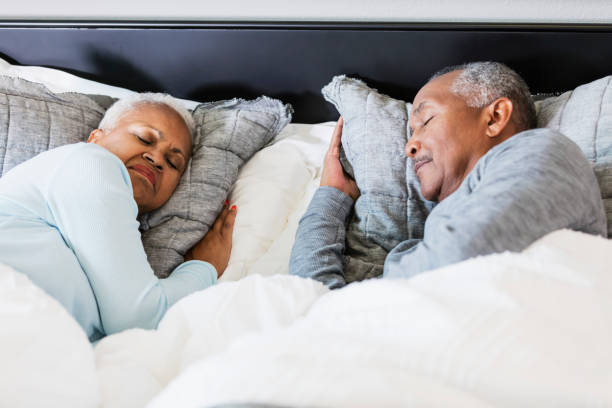
By Stacy M. Brown, NNPA Newswire Senior National Correspondent
While the American divorce rate remains high, another type of marital separation continues to increase in the bedroom.
In a world where restful slumber is a prized luxury, an intriguing trend is quietly gaining momentum among weary Americans.
Tired of blanket bandits, restless bedmates, and thunderous snorers disrupting their nocturnal peace, more individuals are switching to the radical solution known as “sleep divorce.”
The phenomenon, revealed by a new survey conducted by the American Academy of Sleep Medicine (AASM), highlights a fascinating shift in sleeping habits, as more than one-third of participants admitted to occasionally or consistently retreating to a separate room to salvage their precious sleep.
A new study that included more than 2,000 adults unveiled intriguing gender disparities, with men emerging as the primary proponents of this novel practice.
Astonishingly, nearly half of the male participants (45%) confessed to occasionally or consistently seeking refuge in alternative sleeping quarters, compared to a modest one-fourth (25%) of their female counterparts.
The rationale behind this slumber separation goes beyond mere personal comfort; it delves into the intricate web of relationships, said Dr. Seema Khosla, a notable pulmonologist and spokesperson for the AASM.
Khosla elucidated the intricate connection between sleep quality, emotional well-being, and interpersonal dynamics.
“We know that poor sleep can worsen your mood, and those who are sleep deprived are more likely to argue with their partners,” Khosla explained.
“There may be some resentment toward the person causing the sleep disruption, which can negatively impact relationships. Getting a good night’s sleep is important for both health and happiness, so it’s no surprise that some couples choose to sleep apart for their overall well-being.”
Indeed, the ripple effect of sleep deprivation extends far beyond the confines of the bedroom.
Research revealed that individuals enduring consistent sleep disturbances within their relationships are more prone to conflicts with their partners.
Further, researchers found that sleep deprivation diminishes empathetic accuracy, impairing the ability to comprehend and interpret their loved one’s emotions effectively.
The survey illuminated fascinating insights into the demographics of sleep divorces.
A striking 43% of millennials acknowledged occasionally or consistently migrating to separate sleeping quarters, followed by 33% of Generation X individuals.
Surprisingly, 28% of Generation Z representatives and 22% of baby boomers also embraced the unconventional sleep practice.
Although “sleep divorce” may evoke harsh connotations, it embodies a prioritization of sleep and a quest for nocturnal tranquility, Khosla asserted.
The doctor dispelled any misunderstandings surrounding the terminology.
“However, if it is one partner’s loud snoring that is leading to separate sleep spaces, then you should encourage that partner to talk to a doctor about obstructive sleep apnea. This applies to both men and women who may snore,” Khosla stated.
Indeed, loud and persistent snoring is not merely a bothersome annoyance; it often signifies a prevalent sleep disorder known as sleep apnea.
While not every snorer suffers from the condition, snoring is a vital warning sign that should not be taken lightly, experts suggested.
Medical experts said snoring becomes a pronounced indication of potential sleep apnea when accompanied by choking, gasping, or intervals of breathless silence during sleep.
Beyond the disruptive nighttime noises, sleep apnea manifests through telltale symptoms.
Fatigue, daytime sleepiness, unrefreshing slumber, persistent headaches upon awakening, nocturnal awakenings to use the bathroom, difficulty concentrating, memory impairment, diminished libido, irritability, and drowsiness during sedentary activities such as watching television or driving are all commonly associated with this sleep disorder.
Excessive body weight is also a critical risk factor for sleep apnea, researchers stated.
Click here to view the full study.

